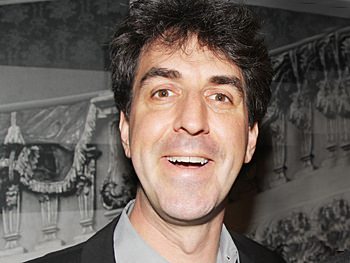Jason Robert Brown’s Parade is a gut-punch of a musical about the 1913 murder trial of an Atlanta Jewish man, his unjust conviction, his subsequent semi-exoneration to “only” life in prison, and his 1915 kidnapping off a prison farm and lynching by a mob.

How much of this brew of political maneuvering, race relations, anti-Semitism, intra-cultural misunderstandings (even within Southern Jewish culture itself) and pure love is drawn out by Mr. Brown’s pounding, pulsing and soaring score was revealed last night in a semi-staged, one-night production at Lincoln Center’s Avery Fisher Hall starring Jeremy Jordan and Laura Benanti.
With Parade in Concert, the organization Manhattan Concert Productions continued a record it has established of bringing top Broadway and film performers together with full orchestras and large standing choruses to perform one night of emerging landmarks in the American musical canon. With Mr. Brown conducting the New York City Chamber Orchestra and a selected ensemble of nearly 200 singers from high school, collegiate and community choruses around the country, the Broadway and regional actors presented their songs and scenes with a powerful musical background to drive the story.
The highlight of the performance was Mr. Brown’s brilliant musical depiction of the murder trial of Leo Frank that takes up the second half of Act 1 with a suite of nine songs tossed all around the cast.
Flawless performances were turned in by four young actresses – Emerson Steele, Caitlan Houlahan, Ephie Aardema, and Allie Trimm – depicting girls (remember, no child labor laws then!) working in Leo Frank’s Atlanta pencil factory. Ms. Steele sang as the murdered girl Mary Phagan in a device in which her supposed “testimony” of how she saw Mr. Frank before her death is channeled through her would-be boyfriend. The three others, along with Mr. Jordan as Leo Frank, performed a brilliantly jazzy depiction of the accused murderer’s supposed depravities, effortlessly tossing off Mr. Brown’s wild rhythmic variations, including one section where Leo Frank and the three factory girls are literally singing in different time signatures.
Katie Rose Clark as Mary Phagan’s mother sang achingly of her dead child in “My Child Will Forgive Me,” setting up a savage final line that I can’t repeat here but stops the show in its tracks until the next witness is called. John Ellison Conlee as the politically ambitious prosecutor and Andrea Jones-Sojola as the Frank couple’s maid and housekeeper delivered on their sung contributions to the tense, emotionally charged trial.
But the absolute highlight of the trial-in-music was delivered by Joshua Henry as Jim Conley, the pencil factory’s cleaning supervisor, with “That’s What He Said,” a driving, mocking piece of increasingly fanciful “testimony” backed by the entire cast and chorus that almost tore the roof off Avery Fisher Hall. Mr. Henry, who just earned his second Tony nomination, returned in Act 2 with Mr. Brown’s blues-inspired “Feel the Rain Fall” in which Jim Conley recants (or at least alters) his testimony while serving on a chain gang after being challenged by the conscience-stricken governor of Georgia. Watch out for Mr. Henry for much more to come in his Broadway career.
Assisting in all of this was stunning preparation over just a four-day period by the assembled chorus of non-professionals. Absolutely superb diction in the off-beat backup singing against Mr. Henry’s lines as well as in a funeral hymn earlier in Act 1 kept the evening from going into a non-dramatic, “wall of sound” pure concert mode, a major danger in these types of events. While Mr. Brown conducted his own music, credit must go to Musical Supervisor Tom Murray who did most of the prep work with the assembled performers.
For Mr. Jordan as Leo Frank and Ms. Benanti as his wife Lucille, the highlights were two Act 2 duets. “This is Not Over Yet” weaves in and out of scenes in which key witnesses in the trial are in effect re-examined and, in rapid overlapping rhythms, expresses the optimism of a hoped-for full exoneration. “All the Wasted Time” is one of the most dramatic and poignant songs yet written by Mr. Brown – a soaring melody in lines traded and overlapped by the two actors until they join together at the end. Its dramatic placement in Parade – occurring the afternoon before Leo’s midnight kidnapping out of prison by a lynch mob – was enhanced even further by Ms. Benanti’s excellent, heart-breaking depiction of Lucille Frank’s misplaced optimism in both dialogue and song.

One-shot deals of this type do have their risks and there were occasional burps and bobbles in the performance, which did witness the performers carrying around their scores for periodic reference (although Ms. Benanti in particular didn’t seem to need it).
The sound operators did not always know where to bring up singers, particularly at the beginning of rapidly-traded-off sung plotlines. Mr. Jordan didn’t quite know what to do with his book in one of the most gut-wrenching early scenes, when he suddenly realizes that Leo is under suspicion by the police and he tries to rip off his shirt to show that he had no scratches or blood marks from the presumed struggle with the victim. (He probably should have just slammed it to the floor as some of the other actors did in analogous, physically active moments in the play.)
A scene between Leo and his own lawyer in which the lawyer reads trumped-up accusations about Leo’s background from a newspaper fell flat in timing, as the actor playing the role of the defense lawyer didn’t seem prepared. And there was one perhaps unintended consequence of having a large standing chorus. In the chain-gang blues number there were so many people performing a background finger-snap-and-clap rhythmic accompaniment that Mr. Henry as Jim Conley, even miked, had to shout his spoken lines to be heard.
But the source material and the music in Parade is so strong that these moments slid right on by. And if Mr. Brown ever gets tired of this create-amazing-musicals gig he’s got going on, he can just get a job as a conductor on Broadway or in the concert hall. His conducting is fluid, economical, and very clear all at the same time – something you can’t even say about all conductors of major symphony orchestras.
I had the privilege of music-directing Parade in 2013 in a production directed by Craig Pettinati at Kensington Arts Theatre. As an avowed Jason Robert Brown aficionado, I recognized the electric atmosphere at Avery Fisher Hall, as this highly anticipated event seemed to illustrate the typical gradual rollout of Mr. Brown’s shows to full acceptance. Parade actually dates from 1998 (although it’s now been re-orchestrated multiple times) and the way it has only gradually taken its increasingly prominent place among musicals to get to this point in 2015 reminds me of what might happen with Mr. Brown’s shows like The Bridges of Madison County, which had a foreshortened Broadway run last year but goes out on tour later this year and no doubt will eventually be released for regional and community theaters. The enormous response for Mr. Brown at the beginning and end of the evening from the Avery Fisher Hall crowd represents the knowledge and confidence that his extraordinary inventiveness will only continue to grow in cultural consciousness for many years to come.
Running Time: 2 hours and 25 minutes, with one 20 minute intermission.
Parade in Concert, presented by Manhattan Concert Productions, was performed for one night on February 16, 2015 at Avery Fisher Hall at Lincoln Center in New York City. For Manhattan Concert Productions’ future events, see their website.
RATING:




